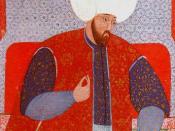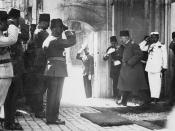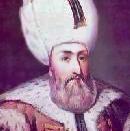The Ottoman Empire was one of the greatest empires of the world. "Their moment of glory in the sixteenth century represented one of the heights of human creativity, optimism, and artistry. The empire they built was the largest and most influential of the Muslim empires of the modern period, and their culture and military expansion crossed over into Europe." (Hooker) The Ottoman Empire lasted until the twentieth century.
Pressured out of their homeland in the Asian steppes by the Mongols during the late 1200's a group of nomadic Turks settles in the region of Anatolia, in western Turkey. They were called the Oghuz and they settled under the Seljuks. The Turks called themselves the Ottomans after their first leader, Osman. By the 1300's, the Ottomans controlled a small state in Anatolia and the Seljuks power was declining. By 1326, they had captured Bursa and made it their capital. The Ottomans faced conflicts against other small Muslim states but by the 1400s, they managed to extend their influence into most of Anatolia, parts of Europe, Macedonia, Bulgeria, and into the Byzantine Empire.
In 1402, the Ottomans moved their capital to Edirne in Europe, where they became a threat to the end of the Byzantine Empire.
The Ottomans yearned to conquer Constantinople because it would be the downfall of the Byzantine Empire and it would give them control of the East-West trade. Under Sultan Mehmed "The Conqueror" they reached their goal. Constantinople was conquered in 1453, and it was renamed Istanbul. Istanbul became the capital of the Ottoman Empire. It flourished into one of the wealthiest and most beautiful cities of the world.
The Ottomans were fortunate to have many great and able rulers. The empire was expanded under Sultan Selim I, but it was under his son, Sultan Suleiman I that...


